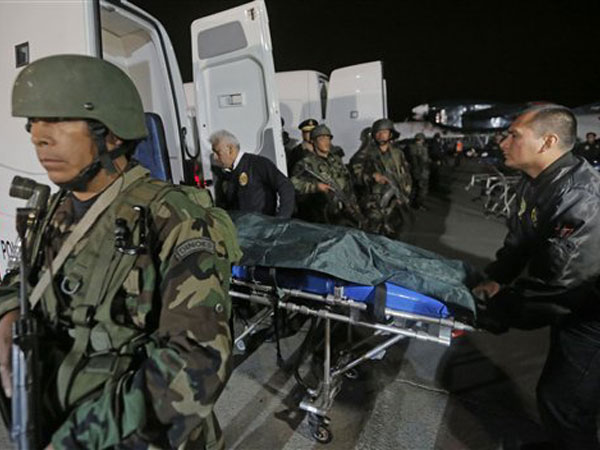Peru says Shining Path number two killed in clash

In this photo released by Peru’s Defense Minister, police officers stand guard during the arrival of the remains of two leaders of the Shining Path rebel group at a police base in Lima, Peru, Monday, Aug. 12, 2013. AP/ Defense Minister, Alberto Orbegoso
LIMA – The number two leader of Peru’s Shining Path is believed to have been killed with two other guerrillas in a battle with government forces, President Ollanta Humala said Monday.
Intelligence sources from the country’s southeast indicated that the Shining Path’s number two commander, Alejandro Borda Casafranca, known as “Comrade Alipio,” was killed, said Humala.
Also slain, according to the intelligence, was Antonio Quispe Palomino, “Comrade Gabriel,” the younger brother of the Maoist guerrilla group’s leader, Victor Quispe Palomino.
A third individual, identified as a right hand man to Borda Casafranca who goes by the nom de guerre “Comrade Alfonso,” was also slain, according to Humala.
“It’s a severe blow to terrorism,” the Peruvian president said, predicting that remnants of the guerrilla group would go into a leadership crisis.
Article continues after this advertisementHe said DNA testing would be performed to confirm the identities of the dead rebels, but their deaths were “good news” for Peru.
Article continues after this advertisementThe clash occurred Sunday night in Llochegua, a rugged jungle area in the Apurimac, Ene and Mantaro River Valley where Shining Path guerrillas work in partnership with cocaine traffickers.
The leftist Shining Path’s insurgency began in 1980, but the group was largely dismantled when its leaders were captured in the mid-1990s.
The conflict left 69,000 dead, according to Peru’s Truth and Reconciliation Commission.
Some rebels took refuge in remote regions of the country after the Maoist group was disbanded in September 1992 with the capture of its paramount leader Abimael Guzman.
Analysts say the latest killings are further evidence that the Shining Path is severely weakened and that the government has the upper hand.
Guerrilla leaders “are going to keep falling because they have no ideology and the only loyalty of its members is a monetary loyalty,” Carlos Tapia, a sociologist and former member of the Truth and Reconciliation Commission, told AFP.
Although the rebels have continued to mount deadly attacks, Tapia said members would continue to inform on each other, if the price was right, helping the government mount operations.
Fernando Rospigliosi, a political analyst and former Peruvian interior minister, agreed and said better army intelligence work in recent times means “the rebels will have to withdraw.”